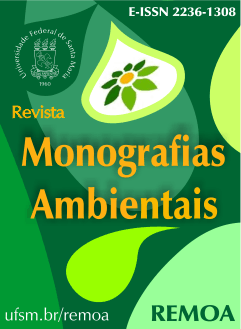Production and waste recycling with a focus on plastic residual
DOI:
https://doi.org/10.5902/2236130811043Keywords:
Waste, Recycling, Selective collection, Residual, PlasticAbstract
Through a survey of documentary character, the present study aimed to perform an analysis on the production and recycling of waste in the world and especially in Brazil, focusing on plastic waste. For its development methods were used documentary research, and qualitative and quantitative methodological procedures that provided achieve the goal of the study. With this study it was concluded that only 13.92% of the population had, in 2012, access to selective collection service and that there is a need to establish the structures and services of the same base in the country, as well as avoid dispersion of practices that converge to the awareness of the need to prevent the union of trash; being degrowth at source, reuse and recycling of the same key elements to mitigating the residual in landfills, especially the character of plastic. And that restrictions on the use of plastic bags in certain countries are some of the means which provide changes in thinking companies and people seek more sustainable means of production.
Downloads
References
ANDRADE, J. B. L. Determinação da composição gravimétrica dos resíduos de Serviços de Saúde de diferentes estabelecimentos geradores. In: Congresso Brasileiro de Engenharia Sanitária e Ambiental, 20, 1999, Rio de Janeiro. Anais... Rio de Janeiro: ABES, 1999. p. 1666-72.
ANDRADE, J. B. L. Determinação da composição gravimétrica, peso específico e teor de umidade dos resíduos sólidos produzidos na Cidade de Manaus. Manaus: Secretaria Municipal de Defesa do Meio Ambiente, 1992.
ASSOCIAÇÃO BRASILEIRA DE EMPRESAS DE LIMPEZA PÚBLICA E RESÍDUOS ESPECIAIS. Dados 2011. Disponível em: http://www.abrelpe.gov.br/. Acesso em: 15 out. 2011, 11:23:57.
COMPROMISSO EMPRESARIAL PARA RECICLAGEM. Pesquisa Ciclosoft 2012: Radiografando a Coleta Seletiva. São Paulo, 2013.
GIL, Antonio Carlos. Como elaborar projetos de pesquisa. 4ª edição. São Paulo: Atlas, 2002.
INFRAESTRUTURA DE CHAVES PÚBLICAS BRASILEIRA - ICP - BRASIL. Diário Oficial da União - Seção 1 - Nº 170. Disponível em: http://www.in.gov.br/visualiza/index.jsp?data=31/08/2012&jornal=1&pagina=81&totalArquivos=272. Acesso em: 19 out. 2013, 02:14:46.
INSTITUTO BRASILEIRO DE GEOGRAFIA E ESTATÍSTICA - IBGE. Pesquisa Nacional de Saneamento Básico de 2008. Rio de Janeiro, n. 1, 2010. CD-ROM.
SANTOS, A. S. F. AGNELLI, J. A. M. A. MANRICH, S. Tendências e desafios da reciclagem de embalagens plásticas. Polímeros: ciência e tecnologia, v. 14(5), p. 307-312, 2004.
SANTOS, Antonio Raimundo dos. Metodologia Científica: a construção do conhecimento, Rio de Janeiro, DP&A editora, 1999.
SIMONETTO, E. & BORENSTEIN, D. Gestão operacional da coleta seletiva de resíduos sólidos urbanos: abordagem utilizando um sistema de apoio à decisão. Gest. Prod, vol.13, no.3, p.449-461, 2006.
VIEIRA, A. Brasil produz 61 milhões de toneladas de lixo por ano. Disponível em: http://www12.senado.gov.br/noticias/materias/2012/03/09/brasil-produz-61-milhoes-detoneladas-de-lixo-por-ano. Acesso em: 7 mar. 2013, 17:25:41.
VILELA-RIBEIRO, E. B. et al. Uma abordagem normativa dos resíduos sólidos de saúde e a questão ambiental. Revista
Eletrônica do Mestrado em Educação Ambiental, v. 22, p. 168-176, 2009.
WALDMAN, M. Aposentando a sacolinha. Ambiente Urbano, Santo André, n. 44, p. 17, 1 abr. 2010.
WALDMAN, M. Lixo: Acertando na Cesta. Ambiente Urbano, Santo André, n. 38, p. 19, 1 set. 2009.
WALDMAN, M. Ribeirão Pires: Água e Dilemas. Diário do Grande ABC, Santo André, p. 02, 5 nov. 2007.
Downloads
Published
How to Cite
Issue
Section
License
Ethical guidelines for journal publication
The REMOA is committed to ensuring ethics in publication and quality of articles.
Conformance to standards of ethical behavior is therefore expected of all parties involved: Authors, Editors, Reviewers, and the Publisher.
In particular,
Authors: Authors should present an objective discussion of the significance of research work as well as sufficient detail and references to permit others to replicate the experiments. Fraudulent or knowingly inaccurate statements constitute unethical behavior and are unacceptable. Review articles should also be objective, comprehensive, and accurate accounts of the state of the art. The authors should ensure that their work is entirely original works, and if the work and/or words of others have been used, this has been appropriately acknowledged. Plagiarism in all its forms constitutes unethical publishing behavior and is unacceptable. Submitting the same manuscript to more than one journal concurrently constitutes unethical publishing behavior and is unacceptable. Authors should not submit articles describing essentially the same research to more than one journal. The corresponding author should ensure that there is a full consensus of all co-authors in approving the final version of the paper and its submission for publication.
Editors: Editors should evaluate manuscripts exclusively on the basis of their academic merit. An editor must not use unpublished information in the editor's own research without the express written consent of the author. Editors should take reasonable responsive measures when ethical complaints have been presented concerning a submitted manuscript or published paper.
Reviewers: Any manuscripts received for review must be treated as confidential documents. Privileged information or ideas obtained through peer review must be kept confidential and not used for personal advantage. Reviews should be conducted objectively, and observations should be formulated clearly with supporting arguments, so that authors can use them for improving the paper. Any selected referee who feels unqualified to review the research reported in a manuscript or knows that its prompt review will be impossible should notify the editor and excuse himself from the review process. Reviewers should not consider manuscripts in which they have conflicts of interest resulting from competitive, collaborative, or other relationships or connections with any of the authors, companies, or institutions connected to the papers.






